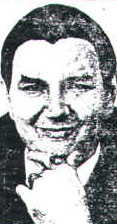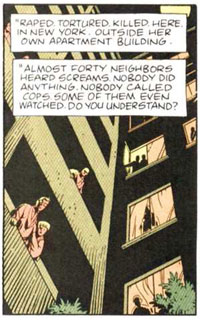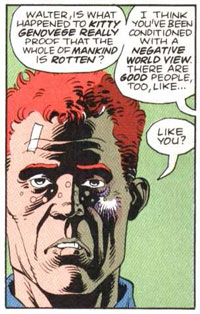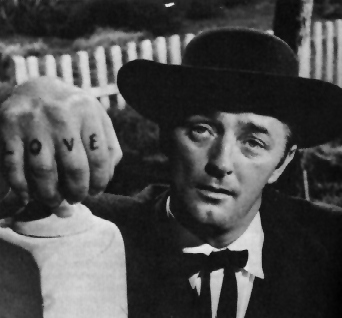Your Fear is All They Have
2007-02-24 02:32:00
Black Magick is a Mistake That Works
 Throughout history, humans have gotten involved with Black Magick because it gives them power. I am arguing that all of the trappings of black magick are beside the point. There is no need to believe in non-human consciousness, and I will not try to convince you that performing certain rituals allows you to contact certain entities. Let us assume that all phenomena related to magick is only occuring inside the heads of those who practice it. Yet the power of black magick remains perfectly real. The power of Black Magick is simply the fear it invokes in other people.
Throughout history, humans have gotten involved with Black Magick because it gives them power. I am arguing that all of the trappings of black magick are beside the point. There is no need to believe in non-human consciousness, and I will not try to convince you that performing certain rituals allows you to contact certain entities. Let us assume that all phenomena related to magick is only occuring inside the heads of those who practice it. Yet the power of black magick remains perfectly real. The power of Black Magick is simply the fear it invokes in other people.
I do think it's irrational to be afraid of Satan. I do not think it's irrational -- or even weird -- to be afraid of what Satan's followers will do in his name. (In the interest of full disclosure, I feel more or less exactly the same about Jehovah and Allah. It's not the invisible monster that worries me, you see, it's the primate worshipping the invisible monster.)
Consider Matamoros, Mexico -- a topic we will be returning to under different circumstances, so I will just give you the Time Magazine summary:
There, under a gray, misty sky, the police made a ghastly discovery. In and around a corral, they found several makeshift graves; the overpowering stench of decaying flesh led to digging that eventually uncovered the corpses of 13 males, one as young as 14. Several of the victims had been slashed with knives, others bludgeoned on the head. One had been hanged, another apparently set afire and at least two pumped with bullets. Some had been tortured with razor blades or had their hearts ripped out. Nearly all had been severely mutilated: ears, nipples and testicles removed, the eyes gouged from one victim, the head missing from another. When officers entered the darkness of the 15-by-25-ft. shack, they found a squat iron kettle whose contents suggested that more than just a band of ruthless killers had been at work. Inside the pot, resting in dried blood, were a charred human brain and a roasted turtle. Other containers held a witch's brew of human hair, a goat's head and chicken parts. After arresting and questioning four suspects, the Mexican police pieced together a horrific tale of a voodoo-practicing cult of drug smugglers who believed that orgies of human sacrifice would win satanic protection for its 2,000-lb.-a-week marijuana-running operation to the U.S. "They felt that all the killing would draw a protective shield around them," observed Texas Attorney General Jim Mattox. "It was religious craziness."
It worked. It's one thing to pursue a criminal investigation into a group of drug dealers, but when you know those drug dealers perform human sacrifices on a regular basis, there's much less of an incentive to bust them. The criminal justice system provides tools to catch and punish individual perpetrators of individual crimes, not an entrenched network of murderers.
This was precisely the same problem police face when dealing with organized crime: even a successful prosecution of a top Mafia leader does nothing to change the core problem. That same Mafia leader still has hundreds of employees and pervasive influence. Cops who fight the Mafia, even the legendary Elliot Ness, never succeed in "taking down orgnanized crime" -- they only slow the machine down and make themselves, and everyone around them, into targets.
This is the core problem that humans face here in the 22nd century: we have no protection against monsters in a free and open society. Which is not to say that there's any safety in a repressive and controlled society, in fact history is pretty clear that monsters usually wind up in charge in those kinds of environments.
All of that is troubling enough, but what complicates the matter even further is this: few people can even admit that monsters exist. We look to Jeffery Dahmer as a sick abberation and ignore our own capacity for brutality. We have a whole pantheon of Evil People to distract us from the fact we're all capable of the same kind of brutality. It doesn't take much.
Ignorance Fuels Atrocity
The Illuminatus! Trilogy is a pretty singular work on a couple thousand different levels, but one passage in particular has always stuck with me, relevant to the German Holocaust:
The first reports of the annihilation camps were passed on to the OSS by a Swiss businessman evaluated as being one of the most trustworthy informants on affairs in Nazi Europe. The State Department decided that the stories were not confirmed. That was early in 1943. By autumn of that year, more urgent reports from the same source transmitted still through the OSS forced a major policy conference. It was again decided that the reports were not true. As winter began, the English government asked for another conference to discuss similar reports from their own intelligence networks and from the government of Rumania. The delegates met in Bermuda for a warm, sunny weekend, and decided that the reports were not true; they returned to their work refreshed and tanned. The death trains continued to roll. Early in 1944, Henry Morgenthau, Jr., Secretary of the Treasury, was reached by dissenters in the State Department, examined the evidence, and forced a meeting with President Franklin Delano Roosevelt. Shaken by the assertions in Morgenthau's documents, Roosevelt pledged that he would act at once. He never did. It was said later that the State Department convinced him, once again, of their own analysis: the reports simply were not true. When Mr. Hitler said Ver-nichtung he had not really meant Vemichtung. An author, Ben Hecht, then placed an ad in the New York Times, presenting the evidence to the public; a group of prominent rabbis attacked him for alarming Jews unnecessarily and undermining confidence in America's Chief Executive during wartime. Finally, late that year, American and Russian troops began liberating the camps, and General Eisenhower insisted that news photographers take detailed movies which were released to the whole world. In the interval between the first suppressed report by the Swiss businessman and the liberation of the first camp, six million people had died.
The concept of organized cults performing ritual sacrifices is straight out of the movies. Even on celluloid, there's generally one person who sees The Awful Truth and spends 90% of the film trying to convince everyone else that such an insane conspiracy is even possible.
Good People Look the Other Way
 For the United States, an equally pivotal landmark event was the murder and rape of Kitty Genovese in New York City, back in 1964. The whole event has stuck with me since I found out about it at age 10, reading the epic "comic book" Watchmen -- as I suspected even then, it provides an important glimpse behind the mask of civilized humanity, much like the aftermath of Hurricane Katrina in New Orleans showed us what a pathetically thin veneer "civilization" is to begin with.
For the United States, an equally pivotal landmark event was the murder and rape of Kitty Genovese in New York City, back in 1964. The whole event has stuck with me since I found out about it at age 10, reading the epic "comic book" Watchmen -- as I suspected even then, it provides an important glimpse behind the mask of civilized humanity, much like the aftermath of Hurricane Katrina in New Orleans showed us what a pathetically thin veneer "civilization" is to begin with.
Perhaps I have a different take on the Kitty Genovese incident than most cynics, though, because to my mind the most important detail is not that 38 people stood and watched a woman get beaten, stabbed and raped. The real key is buried a little deeper, in the life of the murderer himself, Winston Mosley. Although he was clearly a derranged human being -- a confessed necrophiliac no less -- he wasn't prowling New York City with a hacksaw in a trenchcoat, gibbering and drooling. In the antiseptic language of wikipedia:
Moseley gave a confession to the police where he detailed the attack, corroborating the physical evidence at the scene. His motive for the attack was simply "to kill a woman." Moseley stated that he got up that night around 2:00 a.m., leaving his wife asleep at home, and drove around to find a victim. He spied Genovese and followed her to the parking lot.
Moseley confessed to two other murder/rape cases prior to Genovese. The history of serial killers is full of married men who were dismembering young women in basements and garages while spouses and even children went through their idyllic daily routines less than 100 feet away. The adjective "unthinkable" is used all too often in connection with brutal crimes -- I say "all too often" because I can only conclude that the reason these people can get away with killing in the first place is because nobody around them believes that such atrocities are possible.
Didn't Want to Know
In the aftermath of the Kitty Genovese case -- and in the face of newspaper headlines like "Thirty-Eight Who Saw Murder Didn't Call the Police" in the New York Times -- sociologists and psychologists went to work, attempting to find the mechanism behind this unthinkable level of apathy and callousness. Today we have the phrase "Bystander Effect" which is, of course, merely a label. It's just an academic term to insulate us from the fact that, despite advances in clothing and video game technology, humans remain animals primarily concerned with survival and species propagation.
Some Situational Ethics
 What do you do when someone puts a gun in your face?
What do you do when someone puts a gun in your face?
There is only one sane answer to this question. You stay calm and you ask the person with the gun what they want. Although violence is the primary form of entertainment in this culture, few of us give any serious consideration to violence entering our own lives. It is difficult for anyone to stay calm and keep their shit together in a situation they're unprepared for.
Quite predictably, this is something that Asian cultures are familiar with, and already have cultural solutions for. (They are, after all, the most advanced culture on planet Earth, and no amount of public school conditioning will change the actual facts. Sorry, folks. Brainsturbator is racist after all.)
We'll take a look at two different traditions: the Hakagure, recently popularized by the supremely great movie Ghost Dog, and the Buddhist meditation ritual known as Chod.
"Every day when one's body and mind are at peace, one should meditate upon being ripped apart by arrows, rifles, spears and swords, being carried away by surging waves, being thrown into the midst of a great fire, being struck by lightning, being shaken to death by a great earthquake, falling from thousand-foot cliffs, dying of disease, or committing seppuku at the death of one's master."
The quote is a particularly memorable passage of the Hakagure. Perhaps it seems needlessly morbid to the reader, but the method behind the madness is best illuminated not by the Hakagure itself, but by a parallel practice from Tibetian Buddhism.
 When I was in high school, I ate a lot of acid. By now that will come as a shock to exactly nobody. In my house, all the lights were out by nine or ten in the evening, so I did most of my tripping in the dark, alone, which is an experience I don't exactly recommend. When you give your mind a blank canvas, it will surprise you. The closest I've ever come to a religious conversion was lying on my bed and watching every horror film and porno I'd ever seen collide across my cieling. It was bascially a waking, lucid nightmare and the first time it happened, there was nothing I wanted more than to deny that the imagery I was seeing came from within me. I really, really wanted to believe in Satan, in an external force of evil that was responsible for the unspeakably nasty shit I was watching. I really wanted to have a God to turn to, to protect and shelter me from the horror and the depravity.
When I was in high school, I ate a lot of acid. By now that will come as a shock to exactly nobody. In my house, all the lights were out by nine or ten in the evening, so I did most of my tripping in the dark, alone, which is an experience I don't exactly recommend. When you give your mind a blank canvas, it will surprise you. The closest I've ever come to a religious conversion was lying on my bed and watching every horror film and porno I'd ever seen collide across my cieling. It was bascially a waking, lucid nightmare and the first time it happened, there was nothing I wanted more than to deny that the imagery I was seeing came from within me. I really, really wanted to believe in Satan, in an external force of evil that was responsible for the unspeakably nasty shit I was watching. I really wanted to have a God to turn to, to protect and shelter me from the horror and the depravity.
Fortunately, I'm way too arrogant for that. I eventually came to terms with the fact that my imagination is capable of literally anything, and that despite anything and everything I'd like to believe about Who I Am, I still possess the capacity to be another Jeffery Dahmer -- in fact a far worse creature than Dahmer, because Jeff was frankly a very stupid little man. It would be really nice to chalk all that up to a battle between cosmic forces I have no control over, but the fact is, keeping that monster under control is my responsibilty and mine alone.
I was living in Montreal several years later when I first read about the Buddhist ritual known as Chod. I immediately recognized it and thought back to the night I decided, with a head full of acid, that it would be interesting to go downstairs into the basement and see how long I lasted. (For the record, I have no clue how long I was down in the basement for but my back ached for weeks afterwards. I don't think I've ever fought so hard to supress my urge to run away in my life. There was quite a bit going on in the basement that night.)
Tibetians, however, having neither LSD nor basements, would perform the following ritual:
In order to practice Chod, we should go to a cemetery, or wherever there are spirits. The best place is the more frightful. Why is this? It is easier to practice in a graveyard because identifying the self-grasping mind that clings to an independent self is accomplished more quickly and easily in a terrifying place. That is why such places are chosen. The purpose of doing Chod practice in frightful places is not only to realize emptiness, but also to develop bodhichitta. Having offered our body to the spirits, there is no longer any need to care about it. We should really visualize our blood as an ocean for the spirits to drink, our body as food for the spirits to eat. It is for the sake of all mother sentient beings that we give up our bodies. "Exchanging self for others" in a graveyard is a very powerful method for developing bodhichitta, because all attachment to the body ceases. Without fear, Chod cannot be practiced. It is fear for the "I" that causes the desperate search for an "I" to hold on to. When the nonexistence of an inherently existent, independent "I" is directly perceived, then we are realizing emptiness. The antidote to such fear is bodhichitta motivation. This is very significant. The place of Chod practice amplifies the necessary fear.
I think that excerpt lays it out clearly enough -- it's a ritual to expand our capacity for fear. When you do things which terrify you, those things become less terrifying. The less you are afraid of, the more you can stay calm. Like most of the really crucial life skills, this logic is so obvious it's boring, and that's precisely why most people never pursue it.
 If you would like to see the most honest horror film ever made, I recommend Night of the Hunter. It features one of the most terrifying and profoundly evil monsters ever filmed: a human being. We live in a culture where fear is a thrill, a cheap spinal tickle that we experience in movie theatres and on roller coasters. Fear is also tool, and fear is also a primal force that will leave you paralyzed and useless when you need a clear mind more than anything. In other words, unless you master your fear, you will be food.
If you would like to see the most honest horror film ever made, I recommend Night of the Hunter. It features one of the most terrifying and profoundly evil monsters ever filmed: a human being. We live in a culture where fear is a thrill, a cheap spinal tickle that we experience in movie theatres and on roller coasters. Fear is also tool, and fear is also a primal force that will leave you paralyzed and useless when you need a clear mind more than anything. In other words, unless you master your fear, you will be food.
This is why I stare into the abyss, and this is why I would urge you all to stand there and take in the view with me. Nothing is unthinkable. Nothing is insane.